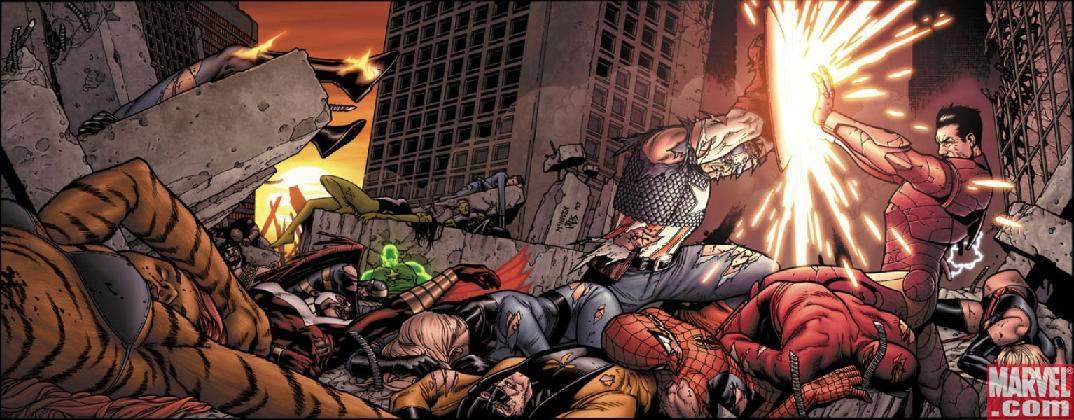This is the first in a recurring series where I look at an older set of comics (either an event or a series) and decide whether it’s worth tracking down.
Mentioning the Civil War comics among comics fans is sure to elicit a strong response – usually negative. Having heard of that for years, when I finally bit the bullet and subscribed to Marvel Unlimited, I knew that Civil War would be on the list of stuff I wanted to read and judge for myself. Doubly so once the next Captain America movie was announced as a loose adaptation of the storyline.
The gist of the story, if you are unaware, has anti-superhero sentiments coming to a head after the New Warriors (a group of teenaged heroes with a reality TV show) attempt to apprehend a group of supervillains, including Nitro. As you might guess Nitro’s power is that he can explode, and he does, killing over 600 people including 60 kids at a nearby elementary school. The American government quickly passes the Superhuman Registration Act, with the full support of Tony Stark and Reed Richards. Stark believes that costumed heroes should register their identities with the government in exchange for training and support. Captain America opposes this, as there are numerous heroes that have families whose safety would be threatened if their names get out.
The biggest issue I had was, in order to get clear battle lines drawn, Mark Millar and company had to skew the personalities of the main characters wildly from the previous status quo. Iron Man was my favorite hero growing up, and I’ve probably read more issues of his books than any hero. While Tony certainly had a tendency to think he was right about things and go all “ready fire aim” it really felt like just about every issue had SOMETHING that I felt just wouldn’t be done by Iron Man.  There’s the greater good, and there’s working with the Kingpin.  Stuff like that.  Cap, too, had been an interesting, complex man in Ed Brubaker’s Captain America comics of the time.  He’d moved past the whole ‘man out of time’ thing, fully informed as to the intricacies and nuance of the modern age.
The other side of things is the art. Â Now, some of the tie-ins are okay, but many of the books are emblematic of the late 90s/early 2000s art that was dark and grimy without fail. Â Did none of the rooms have any lights? Â Was the sun constantly red? Â It’s like every bit of outdoor action happened at dusk after a dust storm.
At the end of the day, Civil War should not be a reading priority.  If you have Marvel Unlimited and nothing else jumps out at you, go for it, but no need to try much harder than that.  Especially since only the barest bones of the story will be in the moving coming out this summer.


Leave a Reply